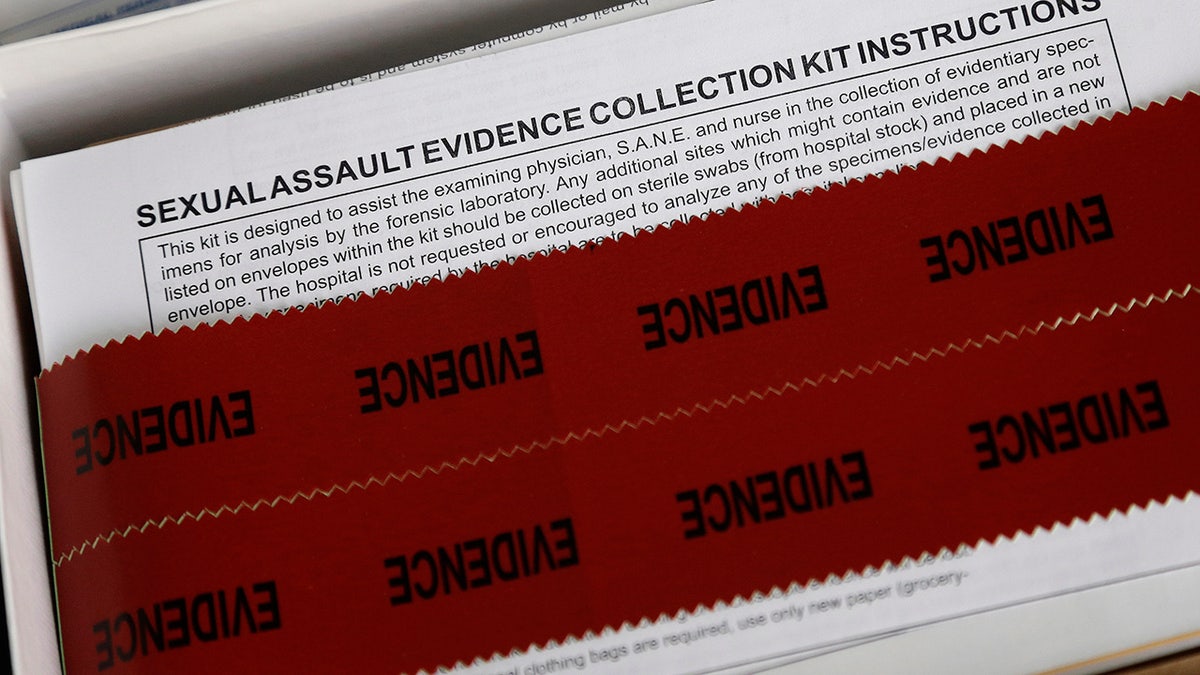
A bipartisan group of lawmakers in both the House and Senate introduced a bill this month to expand access to forensic exams and provide additional guidance to states and hospitals on rape kits. (AP Photo/Gerry Broome)
When Leah Griffin was raped in 2014, she immediately went to the closest hospital to undergo a rape kit exam – the first step, she thought, in prosecuting the man who assaulted her.
But Seattle hospital staff told her their emergency department wasn’t equipped to do the forensic test, and instead she would have to travel to another hospital about an hour away.
Further travel at that moment was not an option for Griffin, who was 28 years old at the time, disoriented from the attack and bleeding. She had her injuries treated at the hospital, and several hours later, when she was able to drive across the busy city, she finally underwent a sexual assault exam.
But by then, so much time had passed and the medical examination at the first hospital “contaminated the crime scene” – contributing factors to prosecutors’ decision not to file charges in her case.
Griffin’s story isn’t an anomaly. According to research by the International Association of Forensic Nurses, only 14 percent of emergency rooms in the U.S. provide services by Sexual Assault Nurse Examiners (SANE). In rural communities, access to rape kits is even scarcer.
To change that, a bipartisan group of lawmakers in both the House and Senate introduced a bill this month to expand access to forensic exams and provide additional guidance to states and hospitals. The bill is being championed by Sen. Patty Murray, D-Wash.; Sen. Lisa Murkowski, R-Alaska; Rep. Peter King, R-N.Y.; and Rep. Pramila Jayapal, D-Wash.
“I want the standard in the United States to change.”
The Survivors’ Access to Supportive Care (SASCA) would direct the Department of Health and Human Services to establish a national training program to expand health care for victims of sexual assault and rape. It would also provide training grants for places in rural and tribal communities.
LET'S UNITE TO SUPPORT JUSTICE FOR THE MILLIONS OF BRAVE WOMEN WHO'VE SURVIVED SEXUAL ASSAULT
“Absolutely, if you have been a victim of sexual assault you should have the peace of mind knowing you can go and get both the care and the sexual assault examination you need so you get both care and justice,” Murray told Fox News in an interview.
She said without a “public light” on hospitals, it was easy for them to avoid financial and regulatory burdens of employing trained SANE officials, and credited Griffin with illuminating the issue.
“I want the standard in the United States to change,” Murray said.
McKenna Williams, 23, was assaulted by a stranger in San Diego in October 2017. She promptly went to a hospital where her immediate needs were treated, but since a SANE examiner wasn’t employed there, she could not get a rape kit.
Eventually, police were able to drive her to the nearest SANE nurse about an hour away. The nurse was so busy with other incoming sexual assault patients she had to interrupt Williams’ forensic exam multiple times.
“That made me really realize how much we need to improve access to getting an exam. It’s so important to actually have evidence when you’re accusing someone of sexual assault,” Williams, a graduate student, told Fox News.
SWEDEN ADOPTS LAW THAT SAYS NON-CONSENSUAL SEX IS RAPE
Williams, who said she was drugged during the attack, didn’t have memory of the assault.
"Evidence was crucial for me to understand what had happened and pursue a case against the person who assaulted me," she explained.
Williams says she considers herself “lucky” because police believed her testimony, and her rape kit has already been processed. The investigation to find her attacker is ongoing.
Griffin, who is now 32 years old and works as a school librarian, said she’s still shocked by how few hospitals are actually equipped to fully treat survivors of sexual assault and rape.
“You see on TV and in the media that victims go to hospitals and get rape kits, and that’s what you’re supposed to do,” she said.
It’s been a little more than four years since she was raped, when she first became angry at “how terrible the reporting system is for sexual assault” victims. In the aftermath, Griffin emailed hundreds of people – from city councilmen to national lawmakers – in an effort to enact a change. Murray was one of the first people to respond to her, Griffin said, thus setting the SASCA in motion.
“It’s been a lot of work, and it’s been a lot of time,” Griffin said. “The extent to which this is a completely unknown issue has been really shocking.”
“I’m very enthusiastic right now because we’ve introduced this bill at a time where people are starting to care about the epidemic of sexual assault in the United States, and we have a very strong bipartisan, bicameral sponsorship for this bill,” she continued. “I really am enthusiastic because I feel like this, in this very divisive time, is an issue that everyone can get behind.”
The next step for the SASCA will be getting through the Senate Committee on Health, Education, Labor & Pensions (HELP).
Approximately one out of every six women has been a victim of rape or attempted rape in her lifetime, according to statistics from the Rape, Abuse & Incest National Network (RAINN), the largest anti-sexual assault organization in the U.S.
About one in every 33 men in the U.S. has been the victim of rape or attempted rape, RAINN found.




